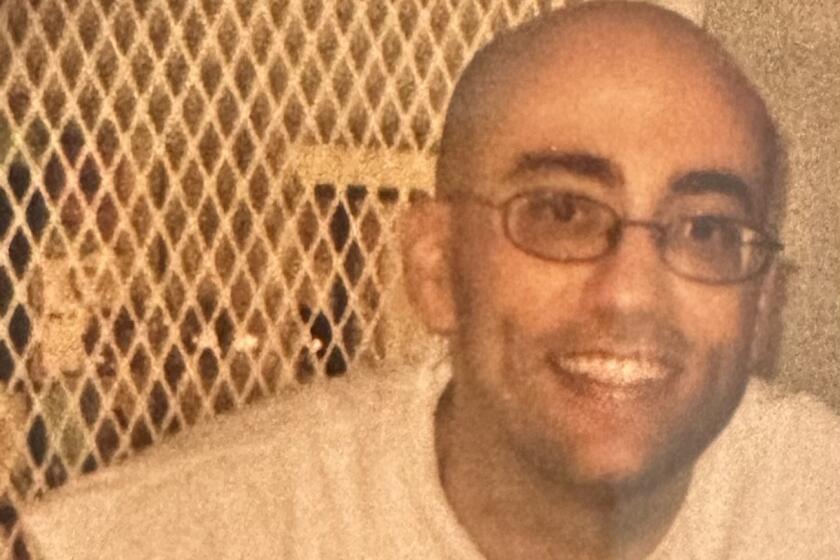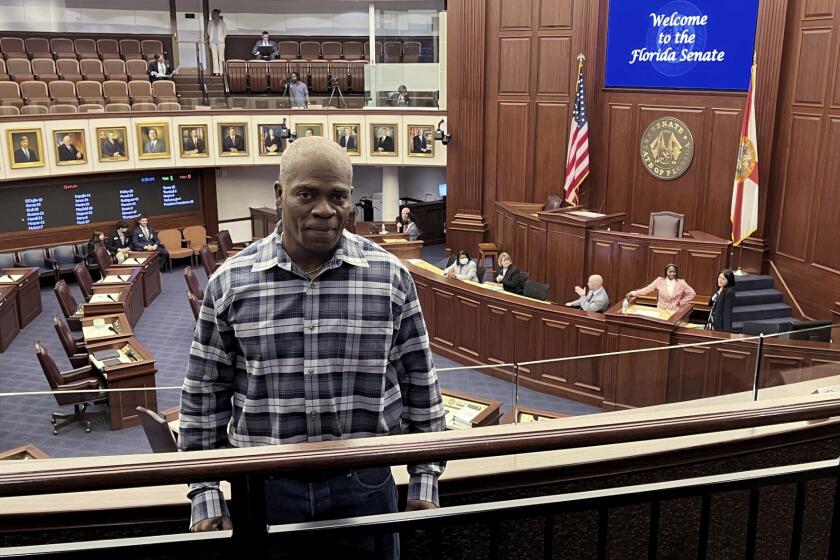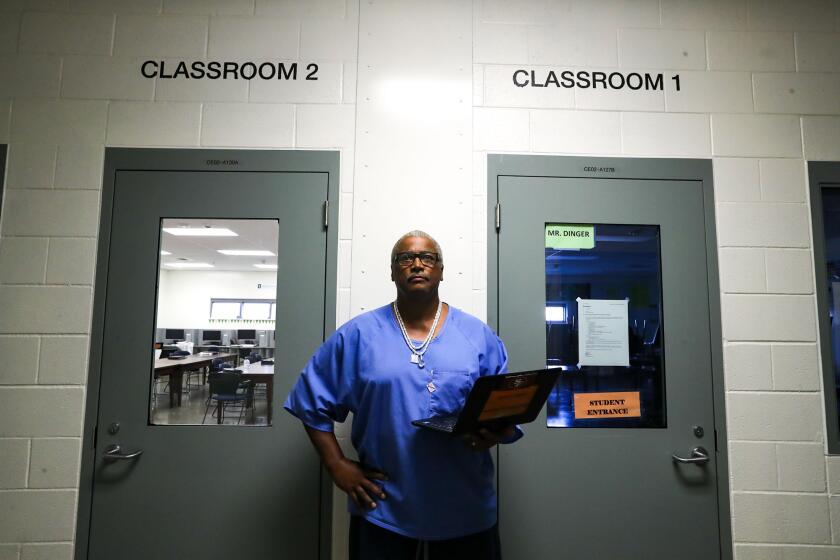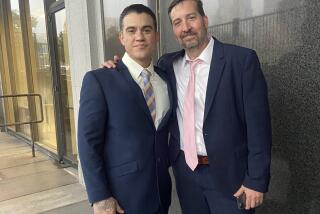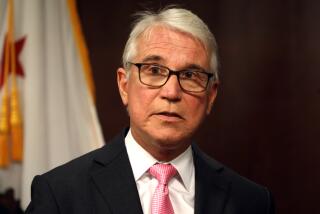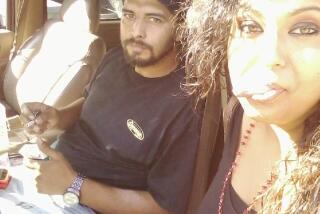He was jailed 23 years ago for murder. The evidence pointed to his brother. A judge has now set him free

- Share via
He spent 23 years in state prison and argued, mostly to deaf ears, that he was innocent and not the gunman who killed an 82-year-old woman driving home in West Whittier in 1998.
On Thursday, Los Angeles County Superior Court Judge William Ryan vacated Miguel Solorio’s conviction and his sentence of life without the possibility of parole, setting him free.
“This nightmare started when I was 19 years old,” Solorio said in a statement provided by the Northern California Innocence Project. “I’m now 44. This was going to be my 25th Christmas in prison. Being home this year will be the best present ever.”
New evidence and witnesses have backed up what Solorio told detectives and prosecutors at the time of the killing: that he had been with his girlfriend and sister the day Maryann Bramlett was shot and killed at a stoplight at Washington and Pioneer boulevards. His brother, his defense attorneys argued, was the gunman.
But detectives had already zeroed in on then-19-year-old Solorio, said Sarah Pace, an attorney with the Northern California Innocence Project who represents Solorio. Detectives ignored and failed to follow up on leads that suggested Solorio was not their man.
“This case is a really excellent illustration of law enforcement having tunnel vision,” Pace said. “There was some evidence that our client may have been involved early on [in the investigation], but there is even more evidence that it could be someone else, but law enforcement never followed up on those leads.”
Jedidiah Murphy was the sixth prisoner put to death in Texas this year. The execution followed a flurry of last-minute legal rulings.
After an independent investigation, the Los Angeles district attorney’s office agreed and asked the court to free Solorio.
“We are delighted that the court agreed with our position and vacated Mr. Solorio’s convictions,” a spokesperson with the district attorney’s office said in a statement. “This case presented serious issues of eyewitness misidentification which are common in wrongful convictions.”
Prosecutors with the office’s Conviction Integrity Unit found the allegations and new evidence from Solorio create “a reasonable probability that the outcome of Mr. Solorio’s trial would have been different,” according to an Oct. 13 letter from the district attorney’s office.
“The Court should grant the Petition and vacate the convictions,” prosecutors said in the letter.
On Thursday, after the judge vacated Solorio’s conviction, the district attorney’s office apologized to Solorio and his wife.
“We thank the hard working Deputy District Attorneys and Investigators in our Habeas and Conviction Integrity Units for their hard work and offer our sincere apology to Mr. Solorio and his wife for all they have suffered for over 20 years,” the statement read. “We will continue to strive to learn from the wrongful convictions to prevent them from occurring in the future.”
Solorio’s case was brought to the attention of the Northern California Innocence Project after new witnesses pointed to his innocence.
“Miguel and his wife never stopped working on this, never stopped trying to overturn his case and get him released,” Pace said. “We discovered a couple of other pieces that showed that an innocent man was sitting in prison.”
Police focused on Solorio early in their investigation after one of the witnesses who interacted with the gunman moments before the deadly shooting told police the shooter identified himself as “Clever” — Solorio’s gang moniker at the time.
“That was it for police,” Pace said.
When Solorio’s attorney’s argued that the 19-year-old had an alibi backed by his girlfriend and sister, prosecutors and detectives dismissed the notion, arguing the two women would be inclined to lie to keep Solorio out of jail.
Solorio’s girlfriend at the time also told detectives the car used in the shooting was used by Solorio’s brother, Pedro.
“The detective doesn’t follow up with questions,” Pace said. “That’s just so problematic.”
Instead, Pace said, when asked during the trial whether Solorio’s girlfriend had brought up Pedro Solorio’s name during her interrogation or provided information about the car, the detective said she had not.
Prosecutors pointed to this testimony during the trial, Pace said, to diminish Solorio’s alibi.
Leonard Allan Cure spent 16 years behind bars for a robbery he didn’t commit. Less than three years after his release, he was shot and killed during a traffic stop in Georgia.
Officials with the district attorney’s office told The Times the new evidence discovered in the case had been forwarded to the division responsible for prosecuting the murder, as well as the investigating agency, to determine whether there was enough evidence to pursue charges against Solorio’s brother, who is now believed to have been the driver in the drive-by shooting.
Court filings indicate that Pedro Solorio contacted his brother multiple times and, in letters, appeared to hint at his involvement in the murder.
In 2007, according to court records, Pedro Solorio wrote to his brother on his birthday and said Miguel Solorio had been “falsely accused of doing something [Miguel] had no knowledge of.”
In the letter, Pedro Solorio said he was considering coming forward to “step up to the plate and make things right.”
Four years later, Pedro Solorio wrote his brother again, saying he planned to get a lawyer “so I can make a deal for myself.”
Pedro Solorio also wrote Miguel Solorio’s wife, Silvia, an email from federal prison telling her not to spend money on an investigator because he, Pedro, would tell her “what really went down on that particular night.”
But Miguel Solorio’s attorneys, in court filings, say his brother never followed up on those promises.
Pedro Solorio’s whereabouts were not immediately clear, but records from the federal Bureau of Prisons indicated he had been released from federal prison after serving time in February 2021.
Ellen Eggers, Solorio’s attorney who first reached out to the Santa Clara University School of Law’s Northern California Innocence Project, said it was Solorio’s girlfriend at the time, Silvia, now his wife, who stood by him and continued a legal fight to prove his innocence.
“Had it not been for his main alibi witness, Silvia, who knew he was innocent, stood by him and married him after his conviction, he might never have seen this day,” Eggers said in a statement.
Silvia has led a years-long effort to find new evidence to prove Solorio was innocent, Pace said. The two married while he was in prison, and Pace said the two are eager to start a new life outside prison.
A master’s degree program in humanities for California prison inmates, launched in collaboration with CSU Dominguez Hills, is described as ‘groundbreaking.’
In their petition for writ of habeas corpus, Solorio’s attorneys also provided new testimony from three witnesses backing up his version of events and pointing to Pedro Solorio as the gunman.
One witnesses, Rosa Baltazar, testified she saw Pedro Solorio grab a gun matching the description of the weapon used in the murder from a dresser drawer and put it in his pocket on the night of the Dec. 6, 1998, killing. She also testified that the brothers’ mother told her Pedro had confessed.
Another witness, Erick Plascenscia, said he saw Pedro leave just before the murder occurred in the car that was spotted at the drive-by.
A third witness, Gustavo Trejo, said he worked with Jose Perez, who had been in the car during the shooting. Perez had allegedly told him he and Pedro had gone out to look for rival gang members and instead accidentally shot an older lady.
After Perez found out that someone else had been arrested in the shooting, Trejo said, Perez told him he was leaving for Mexico.
All of the witnesses have been interviewed and investigated, prosecutors said in a letter to Judge Debra Cole-Hall, and although all three had connections to Solorio and his family 25 years ago, many of them had been disconnected from the family for years now.
“In respectively explaining their willingness to be involved in Mr. Solorio’s case after all these years, each of them has simply stated that it is because Mr. Solorio continues to be incarcerated for something they know he did not do,” prosecutors wrote.
Solorio is incarcerated at Mule Creek State Prison in Ione. A spokesperson for the Northern California Innocence Project said prison officials have five days to release Solorio.
Former Florida lawmaker Joe Harding, sponsor of the state’s ‘Don’t Say Gay’ law, was convicted of fraudulently obtaining $150,000 in pandemic loans.
Solorio’s attorneys also argued the way their client was identified by other witnesses interviewed by law enforcement was deeply flawed.
Another witness called by Solorio’s attorneys, John Wixted, a professor of psychology with expertise in episodic memory, testified that police should have tested a witness’ memory only once when they looked to identify the shooter.
Instead, four witnesses failed to identify Miguel Solorio in the first six-person photo lineup. Investigators continued to ask them to identify the suspect in additional lineups and continued to include Solorio’s picture.
According to the Northern California Innocence Project, this is the third case reviewed by Eggers and the project in which the men convicted were not initially singled out by witnesses but were later identified by them as the perpetrators in court.
“The law needs to be changed to reflect the new consensus: a witness’s memory should be tested only once,” Pace said. “Lives are at stake.”
Los Angeles County prosecutors argued, in Solorio’s support, that the new evidence presented “is straightforward and indisputable.”
“When you look at all of the evidence together, it’s overwhelming that Miguel just didn’t get a fair trial,” Pace said.
More to Read
Sign up for Essential California
The most important California stories and recommendations in your inbox every morning.
You may occasionally receive promotional content from the Los Angeles Times.
